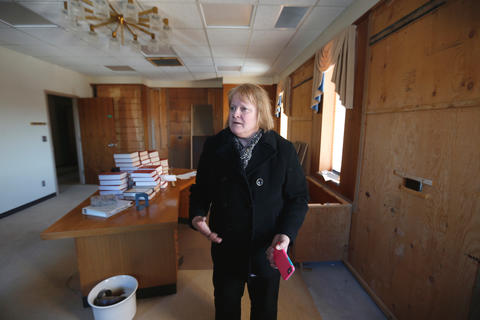The Road to Efficient State Government Is Pitted With Potholes of Parochialism

Sue Foerster, Supt. at the Life Skills and Transition Center in Grafton, walks through one of the vacant offices at the Center recently. photo by Eric Hylden/Grand Forks Herald
North Dakota has a big budget problem resulting from lawmakers building huge spending increases on top of a oil-boom-era revenue tidal wave which was never going to last.
But Governor Doug Burgum, who was elected to his first term in office in a landslide last year, has charged state leaders with looking beyond the current budget shortfall to a fundamental reinvention of the way our state delivers services.
It’s a call lawmakers should heed. Unfortunately our state constitution, and rank political parochialism, are going to be major obstacles.
Case in point, a fight which has erupted over the Life Skills and Transition Center in Grafton (which also operated for a time the San Haven facility you probably recognize from those television ghost hunting shows). Senator Nicole Poolman (R-Bismarck) has proposed a resolution, SCR4013 which got a committee hearing earlier this week, studying whether or not this institution is needed.
[mks_pullquote align=”left” width=”300″ size=”24″ bg_color=”#ffffff” txt_color=”#000000″]We shouldn’t be operating a school or any other state facility for the sake of economic development.[/mks_pullquote]
The facility serves people with disabilities, but Poolman is questioning whether or not it makes sense to have one large facility in a relative rural part of the state providing those services. “The reason behind the study is to take a look at how we can make sure there are community base services across the state,” Poolman told Prairie Public in an interview. “That would allow people to stay closer to family, maybe stay with family. Maybe they want to live independently. Maybe they need to be in group homes. There are all sorts of options out there. But we want to make sure those options are available across the state, not just in one location.”
There is also reason question the efficiency of this particular facility. “We only have about 49 residents there, and we have 327 employees,” Poolman said in the interview.
UPDATE: It seems Senator Poolman was a little off in her numbers. “I saw your blog and would like you to know that on Jan. 1, 2017, there were 87 individuals being served by Life Skills and Transition Center staff in Grafton (76 on campus and 11in the community),” Health Department PIO Heather Steffl emailed this afternoon. “Staff are scheduled in three shifts to provide 24-hr care, seven days a week to meet individual client needs.”
Those numbers seem hard to justify. As a point of reference, Dickinson State University has roughly 3,000 enrolled students who are served by 169 full time equivalent positions. This facility in Grafton has more employees than the North Dakota Highway Patrol, the North Dakota Department of Health, and the North Dakota Attorney General’s Office (which includes the state Bureau of Criminal Investigation).
The budget for the facility is about $60 million per biennium.
A study seems appropriate. Poolman isn’t saying shut it down. Just that the issue deserves some scrutiny.
Not surprisingly, lawmakers tell me the effort is meeting with stiff opposition both from lawmakers in that region (that’s a lot government jobs in their districts) and Department of Human Services bureaucrats.
But this facility – mandated by Article IX, Section 12 of our state constitution – is just one example of how existing laws make it impossible for lawmakers to find efficiencies in state government.
Take a gander at sections 12 and 13 of Article IX. Over the course of just a few paragraphs that text mandates the existence and location of no fewer than 15 different institutions offering public services. Here’s what has to exist and where, per the state constitution, regardless of whether we actually need these institutions or if location is optimal for delivering the services in question:
- University of North Dakota in Grand Forks
- North Dakota State University in Fargo
- Valley City State University in Valley City
- A school for the Devils Lake
- A state training school in Mandan
- Mayville State University in Mayville
- The State Hospital in Jamestown
- The Life Skills and Transition Center in Grafton
- A soldiers home in Lisbon
- A school for the blind in Grand Forks
- Minot State University in Bottineau
- State College of Sciences in Wahpeton
- Minot State University
- Dickinson State University
- A state hospital for the mentally ill
What’s more, the state constitution prohibits lawmakers from establishing any “other institution of a character similar to any one of those” mentioned in these two sections. Meaning lawmakers can’t downsize, say, the Grafton facility Poolman is targeting and build additional facilities providing the same services in other parts of the state.
And the only way to amend the constitution (outside of a ballot measure) is to get a bill through both houses of the legislature and a vote of the people. All in the face of what would be a bitter campaign waged by bureaucrats and local leaders more concerned about jobs and economic impacts than state budgeting.
Which is sad. We shouldn’t be operating a school or any other state facility for the sake of economic development.
Our state government badly needs to be made more efficient, but this portion of our constitution is a major roadblock. It mandates schools and other facilities that the taxpayers may not need, and requires they exist in places which may not be optimal.
Sadly, between the fight over Poolman’s resolution and a bill to remove the State Hospital in Jamestown from the constitution failing earlier this session, I don’t sense that there’s a lot of appetite for it.




